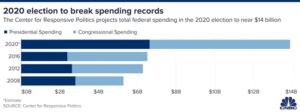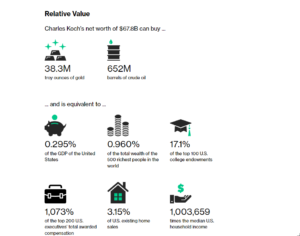July 6, 2022

Money may not be able to buy you love but it certainly can buy you a lot of political influence. Since 1976, when the Supreme Court reached a decision in a case known as Buckley v Valeo, we have been living in a nation that views political spending as an expression of free speech, constitutionally protected from the heavy hand of effective government regulation. That ruling removed limits on campaign spending, giving those with great wealth permission to buy the political influence they need to influence laws and policies to their advantage. . It undermined the meaning of the democratic principles, like one man one vote, that we say, as a nation, we hold dear.

Yes, we all are free to add our financial voices to the political conversation but the volume and impact of our voices depend on the size of our bank accounts. Those with more money can speak louder, and more often. They can dominate the political debate and drown out their opposition. That opportunity was created and then maximized by a small group of wealthy folks who feared the social, political, and demographic changes that were sweeping over our nation, changes that they feared threatened their wealth and their power. Rather than run for office, they built a political spending organization that could operate quietly, almost clandestinely, to bend the working of our government to their liking. They would focus on all three branches of the federal government. They could and would focus on state and local governments when they found themselves stymied at the federal level. They created elite think tanks to help support their positions and “grassroots” organizations to hide the very narrow scope of their concerns. All this is coordinated to protect their very selfish interests under the pretense of protecting “American Values”.
This could be the scenario from a bad political intrigue novel but it’s not. From the beginning, when Buckle v Valeo first was filed, Charles Koch was leading the way, using his great wealth to reshape the nature of American democracy. And his wealth is immense. Koch and his now deceased brother David created a Wichita, Kansas-based conglomerate with interests ranging from oil refining to commodities trading, from pipelines to paper pulp. Its annual corporate revenue is now about $125 billion. Koch Industries has grown to be our nation’s second-largest closely held corporation. Koch’s personal wealth is estimated to be in excess of $60 billion. With that fortune, it was possible to quietly create a political enterprise as formidable as their business had become.
The Koch political playbook takes advantage of every opening for political impact. Mother Jones captured this in a detailed look at the wide-ranging structure of the Koch political enterprise and called it the Kochtopus. It mixes direct political spending, personal and corporate, with the laxness of our nonprofit laws to build a sprawling and often opaque enterprise with a single end goal. “Though the Koch surname has become synonymous with political spending, the family’s philanthropy has flowed to a wide range of causes. A significant portion has gone to think tanks and policy institutes that advance the brothers’ free-market beliefs. And Charles Koch has lavished millions on universities to bolster their study and teaching of this school of economics.”
Jane Mayer, writing for The New Yorker in 2016 described it this way: “A…data-filled study by the Harvard scholars Theda Skocpol and Alexander Hertel-Fernandez reports that the Kochs have established centralized command of a “\’nationally-federated, full-service, ideologically focused’ machine that ‘operates on the scale of a national U.S. political party.’ The Koch network, they conclude, acts like a ‘force field,’ pulling Republican candidates and office-holders further to the right. “ Judging by how right the center of our political debate has become they have built a very powerful force-field.”
And the “Kochtopus” invested all the facets of a multipronged attack on our government’s ability to reign in the excesses of capitalism and protect our health and our planet. It funds and coordinates with groups like the US Chamber of Commerce to fight needed regulations. It funds and coordinates with groups like the Republican Attorney General’s Association to bring lawsuits to court and ultimately before the Supreme Court. And it funds and coordinates with groups like the Federalist Society to create a federal judiciary that will bend the law to its liking.
We are, unfortunately, seeing the harm the combination of Koch and his partner’s politically focused money, their clear vision, and their willingness to take the time it needs to win, bear fruit. Here is what happens when this well-oiled machine turns its attention to the federal regulatory system. Look at the Supreme Court ruling on West Virginia v. Environmental Protection Agency that cut back the EPA’s power to combat climate change. Until this decision the EPA, and other Federal Agencies, empowered by what was known as the Chevron Defense, were able to implement the broad mandates they were given by Congress and take action as conditions and science changed. This made sense because they had the expertise that Congress did not and they could act when the legislative process was stymied by its own arcane rules.
The case emerged from the efforts of Koch-related organizations. The judges who heard the case and gave us this decision had been groomed to do so by Koch-supported organizations and the Senate had been manipulated to approve those judges by forces fueled by Koch money. As Donald Trump’s former White House Counsel Don McGahn very directly put it in a speech when Speaking at the Conservative Political Action Conference on undoing Chevron, “Well, it’s not a coincidence. It’s part of a larger, larger plan, I suppose. There is a coherent plan here where, actually, the judicial selection and the deregulatory efforts are really the flip side of the same coin.”
Koch-related entities played an important role in adding three conservative judges to the Supreme Court in order to gain control of the nation’s highest court. Here’s how the Lever described their effectiveness. “The Koch network’s chief political arm, Americans for Prosperity, led campaigns supporting the confirmation of all three of Trump’s Supreme Court justices: Amy Coney Barrett, Brett Kavanaugh, and Neil Gorsuch. Barrett’s confirmation was a particularly significant win for the fossil fuel industry — she has familial ties to Shell Oil, and refused to recuse herself in a case involving that oil giant.”
Koch-funded organizations gave their now controlled Supreme Court its marching orders in the Amici briefs they filed. “Koch’s Americans for Prosperity Foundation…argu[ed] that the EPA should not be permitted to ‘impose its will on the nation through regulatory diktat…’ Several more Koch-funded dark money groups have filed similar amicus briefs in the case. That includes the Cato Institute, the New Civil Liberties Alliance, the Competitive Enterprise Institute, and the Mountain States Legal Foundation.”
Koch’s strategy does not ignore the importance of building a base that would support their efforts at all levels of government. As described by Chris Cillizza, writing for CNN Politics in 2019: “The Koch brothers instead focused far more on building grassroots infrastructures – focusing, again, on sustainability rather than immediate success. By the 2016 election, Americans for Prosperity had state directors in 34 states, according to the New Yorker’s Jane Mayer. And while most outside groups sought to use their money to influence the presidential race and other high-profile contests, the Kochs often poured their money into far less sexy projects like influencing policy at the state legislative level (through their donations to the American Legislative Exchange Council) and winning majorities in state legislatures around the country (thanks to donations to the Republican State Leadership Committee).”
Koch’s focus is to return our nation to one with a weak central government and with state/local governments that are business friendly. It is in that environment a man with more than $60 billion can earn even more without the annoyances and limitations that come with a more people, equity focused government demands. To get there, voting rights and fair representation (as opposed to partisan gerrymandering), civil liberties, meaningful gun control, public health guidelines in the midst of a pandemic, and racial and gender equity have been acceptable sacrifices. Capitalizing on fear, anxiety, and grievance has proven to be effective. . It has given us an increasingly divided, uncivil society with violence replacing speech.

Charles Koch has been successful in his political investment. He has bought much of what he went after and, amazingly, it has not cost him his fortune. He is, in fact, wealthier today than he was a decade ago when his wealth was estimated to be “only” $25 billion! Charles Koch helped show us how to make money shape government in a way that makes our democracy seem like only words on paper. But he is not alone. There are others who have followed this lead, recognizing that they could protect their very personal interest at a reasonable cost. It does not require them to change their lifestyles nor mortgage their children’s futures. It does not require them to break the law and risk going to jail. It doesn’t even require them to stand for election or serve in office. It just requires using some excess funds to buy their way to political power and let others do their dirty work for them.
Unless we get offended and get angry and say no more, this will only get worse. The choice, at least for a few more weeks or months, is still ours. Koch’s strategy has been so effective that this window is not open very wide and seems to be closing in front of our eyes. And if we let it shut, it will be hard, if it is possible at all, to open it up again.

Thanks for sharing. I read many of your blog posts, cool, your blog is very good.